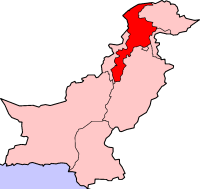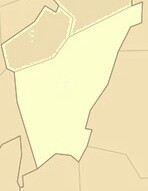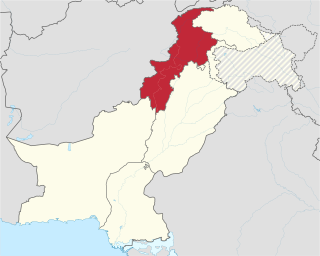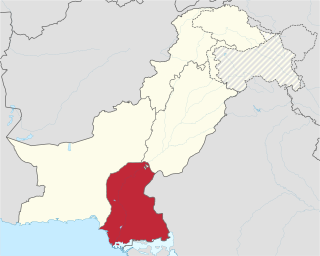 W
WThe Consulate General of the United States in Karachi is located in the province of Sindh in Pakistan and represents the interests of the United States government in Karachi, Pakistan and nearby surrounding areas. It is the United States' largest Consulate General, and is larger, in terms of both personnel and facilities, than many U.S. Embassies. Technically a part of Mission Pakistan, and reporting through the Embassy of the United States in Islamabad.
 W
WCatholic Public High School, commonly known as Sangota Public School, is a private Catholic primary and secondary school for girls in Sangota, Khyber Pakhtunkhwa, Pakistan. It was established in 1962 under the direction of the Diocese of Islamabad-Rawalpindi and was renowned for being the center of quality education in the entire Malakand region. Most of the teachers were Irish Sisters of the Presentation who had devoted their lives to educating Swat's children.
 W
WOn 21 February 2017, suicide bombers targeted a sessions court in Tangi, Charsadda District, Khyber Pakhtunkhwa, Pakistan. At least seven people were killed, including a lawyer and more than 20 others injured. Tehrik-i-Taliban Pakistan faction Jamaat-ul-Ahrar claimed responsibility for the attack.
 W
WThe 2008 Danish embassy bombing was an attack on the Danish embassy in Islamabad, Pakistan on 2 June 2008. The suspected suicide car bombing in the parking lot of the embassy took place at around 12:10 pm (UTC+5), killing at least six and wounding many more. The Danish national security intelligence agency PET concluded that al-Qaeda was behind the attack. Al-Qaeda claimed responsibility for the attack on 5 June 2008. The attack was confirmed to be an answer to the reprinting of Danish newspaper Jyllands-Posten's Muhammed cartoons in February 2006, as well as the presence of Danish troops in Afghanistan.
 W
WThe 2010 Darra Adam Khel mosque bombing occurred on 5 November 2010, when at least 66 people, including children, were killed by a suicide bomb attack in a mosque in the town of Darra Adam Khel, Khyber Pakhtunkhwa, Pakistan. 80 others were wounded as worshippers offered Jumu'ah, the congregational Friday prayers. The mosque, which belonged to the predominate Sunni denomination, was frequented by tribal elders; according to sources, the bomber may have been targeting a local politician who was known for speaking out against the Taliban. The attack was the deadliest after the September 2010 Quetta bombing in Balochistan, which targeted a procession of Shi'a Muslims. Just a few hours after the attack, three grenades were thrown at another mosque in Peshawar; the blasts killed 5 and wounded 24.
 W
WThe August 2008 Dera Ismail Khan suicide bombing took place on 19 August 2008, near the Emergency Ward of District Headquarter Hospital in Dera Ismail Khan, killing 32, including 7 policemen. Tehreek-i-Taliban Pakistan claimed responsibility for the attack.
 W
WThe Islamabad Marriott Hotel bombing occurred on the night of 20 September 2008, when a dump truck filled with explosives was detonated in front of the Marriott Hotel in the Pakistani capital Islamabad, killing at least 54 people, injuring at least 266 and leaving a 60 ft wide, 20 ft deep crater outside the hotel. The majority of the casualties were Pakistanis; at least five foreign nationals were also killed and fifteen others reported injured. The attack occurred only hours after President Asif Ali Zardari made his first speech to the Pakistani parliament. The Marriott was the most prestigious hotel in the capital, and was located near government buildings, diplomatic missions, embassies and high commissions.
 W
WOn 5 October 2017, a suicide bomber targeted the shrine of Pir Rakhel Shah situated in Fatehpur, a small town in Gandawah tehsil of Jhal Magsi district in Pakistan's southwestern Balochistan province. At least 20 people, including two policemen, were killed and more than 30 others injured in the suicide attack.
 W
WOn 8 June 2014, 10 militants armed with automatic weapons, a rocket launcher, suicide vests, and grenades attacked Jinnah International Airport in Karachi, Pakistan. 36 people were killed, including all 10 attackers, and 18 others were wounded. The militant organisation Tehrik-i-Taliban Pakistan (TTP) initially claimed responsibility for the attack. According to state media, the attackers were foreigners of Uzbek origin who belonged to the Islamic Movement of Uzbekistan (IMU), an Al Qaeda-linked militant organisation that works closely with TTP. The TTP later confirmed that the attack was a joint operation they executed with the IMU, who independently admitted to having supplied personnel for the attack.
 W
WThe February 2010 Karachi bombings were a series of two bombings in Karachi in Pakistan on 5 February 2010. At least 25 people died and more than 50 were injured. The attacks which targeted Shia Muslims happened on Arba'een, a religious observation that occurs 40 days after the Day of Ashura.
 W
WThe February 2010 Khyber mosque bombing occurred at a mosque in Dars village in Tirah Valley of Khyber Agency in Pakistan on February 18, 2010. At least 30 people died and more than 70 were injured.
 W
WThe April 2010 Kohat bombings were a pair of bombings that struck a center for displaced people on the outskirts of the town of Kohat, in Khyber Pakhtunkhwa, Pakistan, on April 17, 2010. At least 41 people were killed, while another 64 more were injured. The next day another suicide bombing at a police station killed 7 more and injured nearly two dozen.
 W
WThe March 2010 Lahore bombings were three separate, but related, bomb attacks in the Pakistani city of Lahore on 8 and 12 March 2010. Lahore, with a population of six million, is Pakistan's second largest city, and the capital of the Punjab province. After several attacks in Lahore in 2009, these were the first major incidents in the city in 2010. The 12 March bombings are the deadliest attacks in Pakistan to date in 2010.
 W
WThe July 2010 Lahore bombings occurred on 1 July 2010 in Lahore, Punjab, Pakistan. Two suicide bombers blew themselves up at the Sufi shrine, Data Darbar Complex. At least 50 people were killed and 200 others were hurt in the blasts. It was the biggest attack on a Sufi shrine in Pakistan since 2001.
 W
WOn 15 March 2015, two explosions took place at Roman Catholic Church and Christ Church during Sunday service in Youhanabad, Lahore, Pakistan. At least 15 people were killed and seventy were wounded in the attacks.
 W
WDecember 2009 Lower Dir mosque bombing was a suicide bombing just outside a mosque in the town of Timergara in Lower Dir District in Pakistan on Friday 18 December 2009.Police said that the bomber had tried to enter the mosque during afternoon prayers but didn't succeed due to security measures. He then blew up his explosives-packed vehicle near the gate of the mosque. At least 12 people were killed and 28 wounded in the attack. Most of the dead were policemen who were leaving the mosque after Friday prayers. The mosque is adjacent to the district police headquarters.
 W
WThe Mian Channu school house bombing occurred on 13 July 2009 when at least 12 people including 8 children died, in the city of Mian Channu, Pakistan after an explosion in a school.
 W
WA bombing occurred on 23 December 2015 at a clothes bazaar in Pakistan's Parachinar area in the Kurram Valley. It was not clear whether the bombing was a suicide attack or a remotely controlled detonation. The blast killed 25 people and another 62 were injured.
 W
WThe 2007 Parachinar bombing occurred on 4 August 2007. At least 12 people were killed and more than 43 injured after Ghayor Khan Chamkani, a suicide bomber, detonated a Toyota Corolla near the Eidgah Market and Peshawar bus terminal in Parachinar, the capital city of Kurram Agency and the largest city in the Federally Administered Tribal Areas in northwest Pakistan. The Pakistani Taliban local splinter Sunni militant group claimed responsibility.
 W
WThe 2014 Peshawar cinema bombings refers to a series of back-to-back bombings that took place in Shama Cinema and Picture House between 2 and 11 February where 20 people were killed and 54 others were injured.
 W
WOn 8 August 2016, terrorists attacked the Government Hospital of Quetta in Pakistan with a suicide bombing and shooting. They killed more than 70 people, mainly lawyers, and injured more than 130 others. The fatalities were mainly advocates (lawyers) who had assembled at the hospital where the body of Advocate Bilal Anwar Kasi, the president of Balochistan Bar Association, was brought after he was shot dead by an unknown gunman. Responsibility for the attack has been claimed by various Islamist groups like Jamaat-ul-Ahrar and the Islamic State. Between 70 and 94 people were killed and over 120 injured. 54 of those killed were lawyers.
 W
WOn 10 January 2020, a suicide bombing inside a Taliban-run mosque killed at least 15 people in Quetta, Pakistan. At least 19 others were injured.
 W
WThe 2017 Quetta church attack took place on 17 December 2017 when armed militants and suicide bombers stormed the Bethel Memorial Methodist Church in the western Pakistani city of Quetta, killing nine people and injuring dozens more. The attack was perpetrated by the Islamic State, who claimed responsibility through its Amaq media outlet.
 W
WOn 4 July 2003, 53 Hazara Shias were killed and at least 65 others were injured when the mosque was attacked during the Friday prayer in Quetta, Balochistan, Pakistan. When hundreds of worshipers were offering Friday prayer, three armed men entered the Asna Ashari Hazara Imambargah and started shooting, threw hand grenades and one suicide bomber blew himself up - which left 53 dead and tens of others injured. It was second major sectarian attack on Quetta's Hazaras after the massacre of police cadets. It was the start of the series of killings of Hazaras in Quetta.
 W
WThe November 2009 Rawalpindi bombing was a suicide attack carried out in front of the Mall Road branch of National Bank of Pakistan in Rawalpindi, Pakistan. The blast area was considered to be a very safe and high security place. Tehrik-i-Taliban was blamed for this deadly blast, which occurred when Pakistan government announced £3m in rewards for the capture of the Taliban leadership.
 W
WOn 16 February 2017, a suicide bombing took place inside the Shrine of Lal Shahbaz Qalandar in Sehwan, Sindh, Pakistan, where pilgrims were performing a Sufi ritual after the evening prayers. At least 90 people were killed and over 300 injured.
 W
WThe Shikarpur bombing occurred on January 30, 2015 when Sunni militants linked to the Pakistani Taliban killed at least 61 people and injured 50 in a bombing at a Shiite mosque in the Shikarpur District of Pakistan's Sindh province.
 W
WThe 23 August 2008 Swat Valley bombing occurred on 23 August 2008 when a suicide bomber rammed an explosive-laden car into a police station in Charbagh Tehsil of Swat valley of North West Frontier Province killing 20 people. The Tehrik-e-Taleban organisation claimed responsibility.